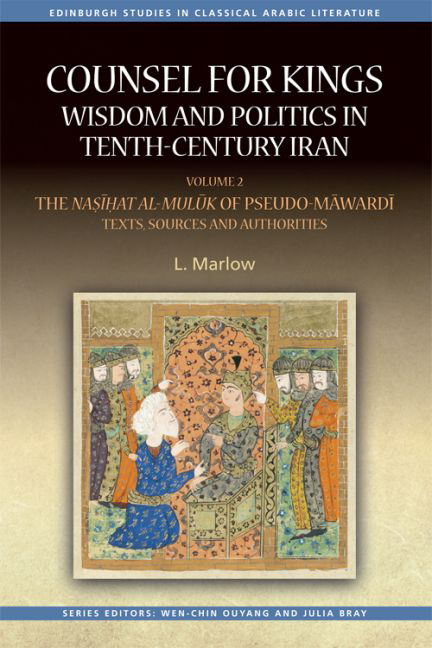 Counsel for Kings: Wisdom and Politics in Tenth-Century Iran
Counsel for Kings: Wisdom and Politics in Tenth-Century Iran 4 - The Governance of the Élites
from Part II - The Three Governances: Translations and Commentary
Published online by Cambridge University Press: 07 October 2017
Summary
Pseudo-Māwardī's sixth chapter develops several themes shared with late antique writers, contemporaries such as Qudāma b. Jaʿfar, and later specialists in ethics, such as Miskawayh and Na‚īr al-Dīn ʺūsī (597–672/1201–74). Grammatically singular, the feminine noun khāṣṣa, like its counterpart ʿāmma, represents a collectivity. An individual member of the collectivity might be described as khāṣṣ, and a plurality of such individuals as khawāṣṣ. Derived from the root kh-ṣ-ṣ, the term khāṣṣa evokes, in relation to the ruler, ‘special’ or ‘distinctive’ status, as opposed to the ‘common’ or ‘general’ status of the ʿāmma.
The singular and collective form of the term khāṣṣa partially obscures the internally differentiated and hierarchical nature of the composite grouping to which it referred. Underlying Pseudo-Māwardī's treatment of the khāṣṣa are the principles of taf∂īl, ‘preference’, patterned after the divine creation, and taqrīb, ‘bringing close’, a reflection of favour, expressed in degrees of proximity to the king's person. These principles created a system of differentiation articulated in terms of a vertical hierarchy, on the one hand, and a circular radius, on the other. Degrees of proximity to the centre of the polity found expression in spatial and physical terms, in the positions assigned to individuals and groups within the royal precinct and in the context of royal audiences, and in symbolic terms, by means of representation of the king beyond the sphere of the royal household. Pseudo-Māwardī's repeated references to ‘the noble and the base, the distant and the close’ (al-sharīf wa-l-wa∂īʿ wa-l-aq‚ā wa-l-adnā) reflect his conception of relative status within the social hierarchy and relative degrees of proximity.
Like many medieval writers, Pseudo-Māwardī assigns the king to a central and intermediary position in a cosmic hierarchy ordered by degrees. Above him are the angels and prophets, whose positions in the cosmic hierarchy provide a mirror for the social order.
- Type
- Chapter
- Information
- Counsel for Kings: Wisdom and Politics in Tenth-Century IranThe Nasihat al-muluk of Pseudo-Mawardi: Texts, Sources and Authorities, pp. 139 - 196Publisher: Edinburgh University PressPrint publication year: 2016


